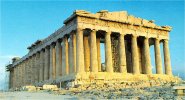By Ekaterina Zhdanova-Redman

|
Ancient Greece - History
By Ekaterina Zhdanova-Redman |

|
 1 Greek legend tells that the Aegean Sea was named after the king of Athens, Aegeus. His son Theseus was one of the great heroes of ancient Greece. He was going to fight the Minotaur, a monster of Crete that had the body of a man and the head of a bull. Theseus promised his father, Aegeus, that on the way home he would replace the black sail on his ship with the white one if the journey were successful. But he forgot his promise; Aegeus saw the black sail far out in the sea and threw himself off a cliff.
1 Greek legend tells that the Aegean Sea was named after the king of Athens, Aegeus. His son Theseus was one of the great heroes of ancient Greece. He was going to fight the Minotaur, a monster of Crete that had the body of a man and the head of a bull. Theseus promised his father, Aegeus, that on the way home he would replace the black sail on his ship with the white one if the journey were successful. But he forgot his promise; Aegeus saw the black sail far out in the sea and threw himself off a cliff. |
Create Weekly Reading Books
Prepare for an entire week at once! |
| Leave your feedback on Ancient Greece - History (Grades 7-9) (use this link if you found an error in the story) |